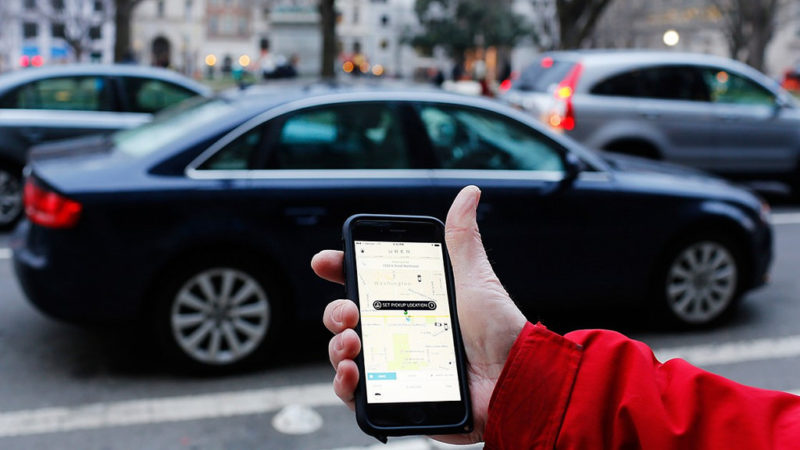The choice doesn't have to be between an exploitative gig economy and no jobs at all. It's time for progressives to come up with solutions.

On same day that Uber had its licence revoked, GMB, the trade union, described the decision as ‘an historic victory for workers’ rights and passenger safety’ and the result of ‘sustained pressure from drivers and the public‘.
Except this wasn’t the case. The licence was revoked for the safety and security of its passengers. TfL didn’t refer to workers’ rights at all in their statement. But given the focus of workers’ rights, not all unions were in agreement.
The Independent Workers’ Union of Great Britain, which has an Uber branch and counts many drivers among its members, referred to the to decision as ‘a devastating blow for 30,000 Londoners who now face losing their job and being saddled with unmanageable vehicle related debt.’
Uber, the corporation that owned no vehicles or – in their terms – employed no drivers, operated a service fee via their app. The business approach has been successful: the drivers enjoy the flexibility and choice the work gives them. Their investors enjoy its data and growth.
Much of it comes down to this: an app, and big data. The latter alone will contribute £322 billion to the UK economy by 2020 according to research by the SAS and the Centre for Economics and Business Research. Notably, as part of their drive for data, Uber has partnered with CityMapper, Facebook messenger amongst others.
Data has become more valuable than oil. The drivers and passengers of Uber, at present have their trips subsidised by Uber’s investors. The aim of course, like every tech company, is to become the market leader – or a monopoly. It’s worth bearing in mind that Uber is set on driverless cars as a model for future growth.
Yet as Izabella Kaminska of the FT observed, Uber’s only innovation is the oldest of all – undercutting and arbitrage. Trade unions are all too familiar with such practices.
So instead of waiting for a good employer in the gig economy; they need to offer solutions and alternatives – instead of petitions to shut down jobs.
Big data is changing the economy, and with it how work is arranged. But there are approaches towards it which recognise the market doesn’t have all of the answers. In fact, the internet, although shaped by business interests, allows for a mutual and cooperative approach.
One example comes from the New Economics Foundation. They are calling for a mutually-owned private hire service to be established. The idea has wider implications too – as the Open Data Institute have argued, we should look at implementing ‘Mobility as a Service’ using open data. As they state:
“We’re moving away from privately owned modes of transportation and towards consuming transportation solutions as a service.”
Unions can play a role in starting to put this into practice. Why not offer a positive alternative to Uber? A co-operatively run approach to the gig economy and private hire could inform better environmental protections, offer greater transparency, and provide social investment for credit unions – such as purchasing vehicles. And it would provide both consumers and drivers with a new public model.
The choice doesn’t have to be between an exploitative flexible economy and no jobs at all. It’s time for labour organisations to come up with the alternatives. Doing so would truly be historic.
Huseyin Kishi is a member of the Green Party and a media reform activist. He can be found on Twitter here.
To reach hundreds of thousands of new readers and to make the biggest impact we can in the next general election, we need to grow our donor base substantially.
That's why in 2024, we are seeking to generate 150 additional regular donors to support Left Foot Forward's work.
We still need another 124 people to donate to hit the target. You can help. Donate today.




One Response to “Rather than celebrating Uber job losses, unions should be putting forward alternatives”
Boffy
I agree that our answer should be co-operative. Uber say that the drivers are self-employed rather than being their workers. In that case, it seems fairly obvious that all those self-employed rivers should club together, with the assistance of the Independent Workers Union, and probably the Co-operative Movement to turn themselves into a Co-operative offering their services, and thereby also better placed to deal with companies like Uber.
A simple TU solution is not enough, because in the next few years, companies like Uber will be able to replace human drivers with self-driving vehicles. A few days ago, Paul Mason correctly made the point that we are heading to a situation whereby in a city like London, all transport will be controlled by a single computer. It makes sense for Uber drivers to work together with the other public transport workers unions in London to create a Transport Co-operative, ready for such a development, so that these technological developments can be used by workers rather than against workers.